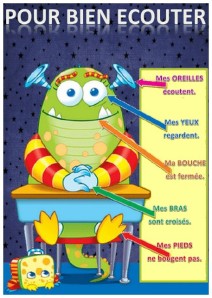Allo? non mais, Allo quoi? Je ne sais pas, vous me recevez?
La bande sonore française
If you are in France, French is the soundtrack to your life, constantly playing throughout your waking hours and filling your brain with intriguing phrases that you find yourself rewinding and playing over and over in your head. You listen passively to the TV, radio and the conversations you overhear on the bus or metro, but also actively when people speak to you directly.
La nécessité est la mère de compréhension
If you are in France, your mind is concentrated by the need to understand and respond to or act on what is said to you. For example, when you receive instructions in a job. It is difficult to compete with that intensity when living in the UK and the most difficult thing when you don’t live in a French-speaking country is to understand French being spoken at a normal (fast!) speed by natives.
L’internet la boite de pandore
The arrival of the Internet has opened up access to a wide range of listening resources in terms of radio, TV and video.
Radio en direct
France Info www.franceinfo.fr/player
France Inter www.franceinter.fr/player
France Culture www.franceculture.fr/player
RFI Monde www.rfi.fr/contenu/ecouter-rfi-direct-monde
RTL www.rtl.fr/direct
Obviously, it is important to actually listen. Occasionally, I have been guilty of putting on French radio as form of linguistic muzak to lend an intellectual ambiance to my flat when I do the housework. It is important to find and listen to something in which you are interested. So if you like football, listen to the commentators screaming « Quel but magnifique! » or if you like celebrity gossip and want to hear what Nabila or Ayem will say next, watch ‘Bienvenue chez Cauet’.
For example, one programme of which I am particularly fond is Tout et son contraire. This programme consists of series of short interviews, with people from a variety of different spheres, in which the presenter, Philippe Vandel, maintains a brisk pace through firing a series of quick questions at the interviewee. The guests don’t have the time to filter their answers and tend to give candid responses. Vandel carries out a lot of research on his guests and employs their previous quotations to focus the discussion. The result is a very lively and engaging insight into the thinking and character of the guests.
La technique d’écouter
For listening exercises I find it incredibly difficult to take notes at the same time as listening. If I am afforded two opportunities to listen, my technique is to scrawl as much as possible the first time and then try to join up the dots on the second écoute.
The problem is that my scribbled notes are invariably illegible. Writing at a high speed in a foreign language results in a surreal stream of consciousness that only occasionally resembles words. In addition, I am not a good listener (just ask my wife) and I find extremely difficult to maintain my concentration over the course of an extended recording. Once I have something which I think vaguely meets the requirements of each comprehension question, I tend to switch off and miss important further information. On other occasions, I lose my way in the relentless babel and halfway through the recording abandon hope of formulating some answers.
Musculation pour les oreilles
For these reasons, to succeed in the listening component of the exam it pays off undertake some intensive listening workouts. One way is working through the listening exercises in the various DALF practice books available. However, the Radio France International website also contains a range of resources to help students practice listening. My French teacher used to get us to listen to the RFI Journal du Monde, which can be downloaded as a podcast from the RFI website, and to identify the key news stories. This is a good exercise to do because, rather than simply ticking boxes or choosing between options, you are required to listen carefully and think about how you can make sense of and summarise the information.
If you have any useful listening techniques, please let me know – J’en ai besoin!









